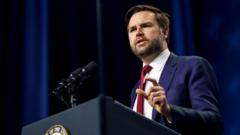Meloni's mission revolves around advocating for a zero-tariff agreement in light of potential economic repercussions for Italy due to recent US tariff announcements.
Meloni's Diplomatic Balancing Act: Navigating US-EU Relations

Meloni's Diplomatic Balancing Act: Navigating US-EU Relations
Italian Prime Minister Giorgia Meloni's visit to the US highlights her complex role as she seeks to align Italian interests while maintaining cooperative EU strategies with Donald Trump.
Italian Prime Minister Giorgia Meloni is in the United States, where she is set to engage in crucial discussions with President Donald Trump. This marks her as the first European leader visiting Washington since Trump introduced a controversial 20% tariff on EU imports earlier this month. Meloni aims to represent both Italy's interests and those of the European Union in her talks with the US president, a challenge she is well aware of given Italy's economic ties to the US, where approximately 10% of its exports, valued at around €67bn ($76bn), are traded.
Prior to her discussions, Meloni disclosed her intention to emphasize a "zero-for-zero" tariffs framework for the EU, reflecting Italy's particular vulnerability to shifts in US trade policy. The Prime Minister underscored her awareness of the current challenges, stating, “We know this is a difficult time... I am aware of what I represent and of what I am defending.”
Meloni's unique political standing positions her to address Trump effectively; she has often praised him and shares certain viewpoints that align with his administration, particularly on topics such as immigration and skepticism toward "globalist elites." Interestingly, she was the only European leader present at Trump's inauguration and has refrained from extensive public criticism of his policies, standing out among her EU counterparts.
Political observers note that Meloni’s approach centers on maintaining a collaborative stance with the US rather than provoking conflict. Political analyst Riccardo Alcaro emphasizes her preference for diplomatic adaptation over resistance, suggesting that if Trump remains inflexible on tariffs, Meloni may yield to counter-tariffs, but her overarching objective will be to avoid jeopardizing US-EU relations.
Concerns among European officials about potential unilateral negotiations by Meloni without EU coordination are palpable, especially as French officials express worries about Trump's strategy to "divide Europeans." The European Commission has welcomed Meloni's outreach, reinforcing the need for collaborative negotiation through EU institutions rather than individual member states.
Aside from trade discussions, Meloni is also expected to highlight the EU's intent to engage with the US on issues beyond economic ties, potentially fostering shared perspectives on defense spending and a unified front against China, although this discourse may be kept discreet.
Back in Italy, reactions to her impending trip vary. Her allies praise her courage, while opposition parties critique her close alliance with Trump, expressing concerns about her prioritization of American over European interests. Amidst elevated scrutiny, Meloni humorously reflected on her diplomatic endeavors saying, "I'm feeling no pressure at all."
Ultimately, Meloni’s visit embodies a delicate balancing act as she champions both her nation’s and the EU’s concerns while navigating the unpredictable waters of US politics.




















